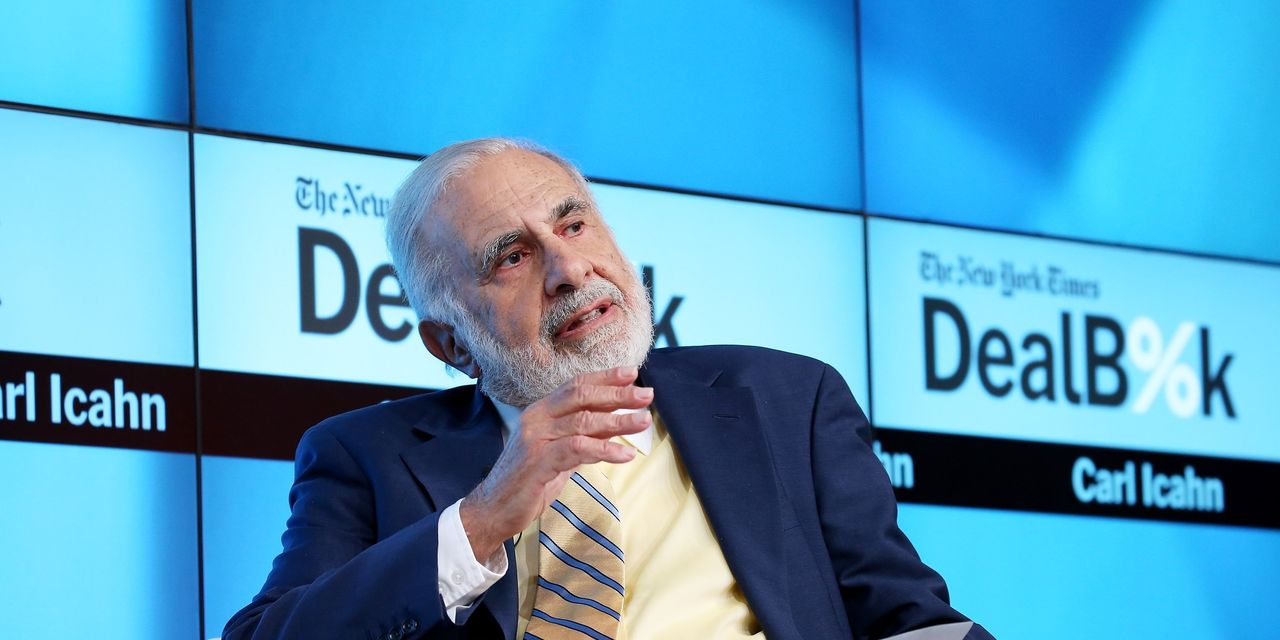Icahn Enterprises L.P.’s stock tumbled 30% on Friday, after the company said it’s cutting its quarterly distribution to $1 from $2 previously.
The company
IEP,
made the announcement as it reported a surprise quarterly loss with Chairman Carl Icahn, the billionaire activist investor, blaming the news squarely on one thing.
“I believe the second quarter partially reflected the impact of short selling on companies we control or invest in, which I attribute to the misleading and self-serving Hindenburg report concerning our company, “Icahn said in a statement.
“It also reflected the size of the hedge book relative to our activist strategy.”
Icahn was referring to a report by short seller Hindenburg Research published on May 2 that accused IEP, Icahn’s publicly traded investing arm, of overstating asset values. Hindenburg also revealed that Icahn himself had borrowed from the company, among other issues.
That had been disclosed in a footnote to financials that Wall Street had overlooked.
Read: What we know about Carl Icahn’s margin loan
See also: Carl Icahn rebuts short seller Hindenburg Research’s report. It’s already cost his company $6 billion in market cap.
The report shaved billions off IEP’s market cap and was firmly rebutted by Icahn, who recently said he has finalized amended loan agreements with banks that untie his personal loans from the trading price of his company’s shares.
Icahn said IEP has paid out distributions for 73 continuous quarters and does not intend for a “misleading” report to interfere with that practice.
“The payment of future distributions will be determined by the board of directors quarterly, based upon current economic conditions and business performance and other factors that it deems relevant at the time that declaration of a distribution is considered,” said Icahn.
On a call with analysts, IEP’s Chief Executive David Willetts highlighted the long-term “lumpiness” of the business, given its many moving parts.
“We have large wins at times and we have volatility, we’re not a company that necessarily has predictable cash flow, there are no guarantees,” he told analysts.
But IEP is not changing its strategy on distributions, he added.
The stock was headed for the biggest one-day selloff since it went public 36 years ago. The next biggest drop was 20.0% on May 2, when the Hindenburg Research report was released.
The company, which is 84% owned by Icahn and his son, Brett, offers exposure to Icahn’s personal portfolio of public and private companies, including petroleum refineries, car-parts makers, food-packaging companies and real estate. Its unit holders are mostly retail investors.
The fund has performed poorly in the past decade. For many years Icahn has publicly expressed suspicion of the bull market that raged around him. He shorted the stock market in a big way as a hedge against his long activist positions. Going into 2021, for example, Icahn’s investment fund had a short exposure of 142%, SEC filings show.
For more, see: Carl Icahn admits he was wrong to take a huge short position on the market that lost $9 billion
Hindenburg, the short selling firm founded by Nate Anderson, took a victory lap on Elon Musk’s X platform, the renamed Twitter, noting that it had predicted that IEP’s poor investment performance would eventually force it to cut the distribution.
Icahn has himself waged endless activist campaigns against companies and their management teams, and most recently succeeded in his effort to shake up management at gene sequencing test maker Illumina Inc.
ILMN,
In June, that company accepted the resignation of its Chief Executive and director, Francis DeSouza, ending a monthslong heated battle over its $7.1 billion acquisition of cancer test maker Grail that has faced regulatory hurdles, as the Associated Press reported.
Icahn had urged shareholders to vote out its chairman, John Thompson, and DeSouza. Company shareholders voted out Thompson in late May.
Past activist campaigns by Icahn’s company have generated billions of dollars for shareholders and helped boards and CEOs capture untapped value, Icahn has argued, citing Reynolds, Netflix
NFLX,
Forest Labs, Apple
AAPL,
CVR Energy
CVI,
Herbalife
HLF,
eBay
EBAY,
Tropicana, Cheniere
LNG,
and Occidental
OXY,
as examples.
IEP said it had a loss of $269 million, or 72 cents per depositary unit, for the second quarter, wider than the loss of $128 million, or 41 cents per depositary unit, posted in the year-earlier period.
Revenue fell to $2.684 billion from $3.796 billion.
The FactSet consensus was for income of 25 cents per depositary unit and revenue of $2.657 billion.
Meanwhile, investors are waiting to see the outcome of a federal probe of IEP’s corporate governance and other issues, which was disclosed along with first-quarter earnings.
IEP’s stock is down 35% in the year to date, while the S&P 500
SPX
has gained 18%.
Read the full article here




